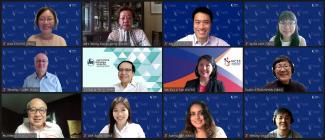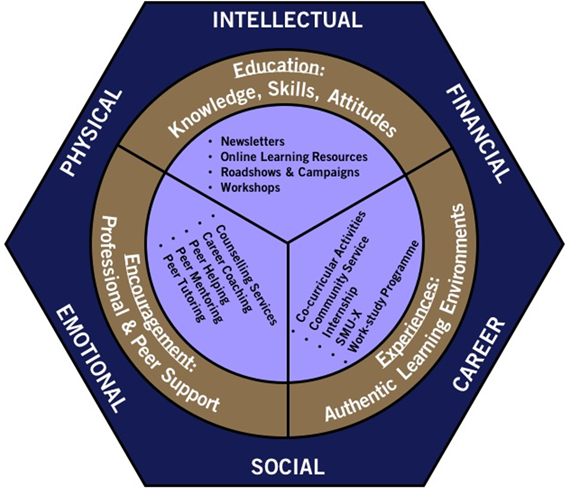
On 18 October, SMU launched its new Resilience Framework for students at the start of its annual Mental Health Awareness Week (MHAW) which took place from 18 to 22 October 2021. Organised by SMU’s Mrs Wong Kwok Leong Student Wellness Centre and held in conjunction with World Mental Health Day, it was an occasion to learn about the enhanced whole-of-university approach to mental wellness and resilience.
Opening Address by Professor Timothy Clark, SMU Provost
In his opening remarks, SMU Provost, Professor Timothy Clark said that “At SMU, we accord great importance to the mental well-being of our students and staff. Despite periods of online learning, we have continued to strive to provide students a challenging yet nurturing and supportive learning environment where they can work towards fulfilling their academic, personal, and professional goals. As part of the university’s comprehensive educational offering, SMU is committed to providing opportunities for students to pick up valuable life skills and coping strategies which we believe will continue to be relevant in their lives even after they leave the university.”
He added that the university has always adopted a proactive and holistic approach towards supporting students’ mental health and the SMU Resilience Framework reinforces the university’s multi-pronged approach to promoting and supporting mental well-being. Through active engagement and close partnership with students, SMU aims to build their capabilities and empower them to make choices towards a more fulfilling life, even when faced with difficult and stressful situations.
He also stressed that SMU cannot, and should not, be alone in championing student mental well-being. “We have benefitted immensely from the exchange and sharing of knowledge, expertise as well as best practices with various partners and our friends from the other Institutes of Higher Learning (IHL). I am very keen that we continue this spirit of collaboration and work towards strengthening this community of practice across the IHLs. I have no doubt that through our collective efforts we can make meaningful impact in enhancing student mental well-being in Singapore and become a beacon of best practice internationally.”
About the SMU Resilience Framework
Mr Alvin Sim, Head, Co-Curriculum Development, Office of Dean of Students then gave an introduction of the SMU Resilience Framework.
Adapted from Hettler’s model that reflects the six dimensions of wellness, the SMU Resilience Framework defines resilience as an active process through which people develop the awareness of, and the ability to make choices towards a more successful life, even when faced with difficulties.
The SMU Resilience Framework (see Diagram) aims to develop resilience in six inter-related dimensions of wellness in students – Physical, Intellectual, Social, Emotional, Career and Financial. A three-pronged approach of Education (imparting knowledge and skills (to both staff and students), and shaping attitudes), Encouragement (providing professional and peer support through various platforms) and Experiences (broadening students’ emotional and psychological horizons through authentic learning environments).
Through the above three-pronged approach of Education, Encouragement and Experiences, SMU aspires to develop resilience in students so that they can be empowered to take charge of their own wellbeing and support the wellbeing of others, even after leaving university. This framework is also aligned to SMU’s Graduate Learning Outcomes (GLO), where resilience and positivity are identified as desired outcomes under ‘Personal Mastery’ (GLO 5).
A suite of programmes and activities supporting the three-pronged approach of Education, Encouragement and Experiences are currently run with additional ones being planned for. For example, under Education, online learning modules and training workshops have been developed to equip staff and students with practical strategies and life skills to look after their mental, emotional, and financial wellbeing, offer advice on when and how to seek help, as well as offer tips to enhance personal and relationship effectiveness.
In the area of career resilience, the Dato Kho Hui Meng Career Centre, as part of its Finishing Touch programme, offers workshops which cover soft skills training and guide students towards building their professional and personal brand as future job seekers.
In addition, SMU is exploring the use of a self-help app to provide support and build a sense of belonging and connectedness with students. The target is to roll out this digital wellbeing platform to all students in the second half of 2022.
While professional support such as counselling services and career coaching is provided to students, the role of peer support and encouragement is equally important in building resilience and this is where SMU Peer Helpers come into the picture. Seasoned Peer Helper, Ms Aanya Jain (Year 4, School of Social Sciences) then shared on her peer helping journey the meaningful contributions of SMU Peer Helpers.
One of SMU’s distinctive pedagogies is experiential learning. The experience of the real world provides the valuable platform for students to broaden their emotional and psychological horizons, and in the process, develop resilience. From internships and SMU-X modules to the array of student clubs, there is a whole host of authentic learning opportunities in SMU.
Ms Lydia Lam Hui Bing, a student leader (Year 3, Lee Kong Chian School of Business), then illustrated the ‘Experiences’ pillar in the SMU Resilience Framework, sharing her reflections from her involvement in a community service project.
As the University works towards operationalising the SMU Resilience Framework, SMU will continue to adopt an evidence-based approach in designing appropriate intervention measures in the three focal areas of Education, Encouragement and Experiences. To better understand students’ sentiments and needs, SMU has initiated the Student Pulse Survey and it will be conducted twice a semester.
The SMU Resilience Framework demonstrates SMU’s ongoing efforts to strengthen students’ mental well-being and raise mental health literacy levels.
Panel Discussion: Mental Health of Students: Challenges and Resources
The topic of the panel discussion was on ‘Mental Health of Students: Challenges and Resources’ and comprised panelists Professor Daniel Fung, CEO, Institute of Mental Health; Ms Tan Li San, CEO, National Council of Social Service; and Ms Lim Jia En, President, SMU Students' Association (Year 3, Lee Kong Chian School of Business). Dr Ada Chung, Head, Mrs Wong Kwok Leong Student Wellness Centre, Office of Dean of Students was the moderator.
Ms Lim was the first to share about the challenges she faced as a university student, while Prof Fung was invited to give his insights on how one could better support the mental wellbeing of university students – how one can be alerted to signs of distress and proactively reach out to them, and to encourage those in distress to reach out. He shared the difference between good stress which keeps us motivated and toxic stress which causes breakdowns to occur. He also said we needed to reduce and eradicate social stigma on mental illness and was heartened to note that some surveys done had indicated that youths were willing to help others who faced mental issues.
Ms Tan then shared about what national level support and resources were available such as a national hotline set up last year in response to increased levels of anxiety, a one-stop app for anyone who is seeking help and resources, and an interagency task force that is continually looking into mental health. She shared NCSS initiative – Beyond the Label which is a movement to address stigma faced by persons with mental health conditions in society. She then encouraged all who had stories to share – whether one has supported another on their mental health journey – on recovery, hope and encouragement, and to hashtag their stories, videos, and post with #stopthestimga. The idea was to make it normal and safe for all to talk about their mental health journey.
The panel then took questions from the audience which covered issues that touched on the vision and future of youth mental health come 2030, how to build resilience, and how we can all better support and look out for each other.
Closing remarks by SMU Dean of Students, Professor Paulin Straughan
In her closing remarks, SMU Dean of Students, Professor Paulin Straughan reiterated that SMU was committed to helping students build resilience throughout their SMU journey, by putting them through various programmes and activities such as internships and community service projects, and preparing them for the workforce in future.
She also thanked everyone involved for putting the event together, as well as acknowledged and thanked two of SMU’s distinguished donors – Mrs Wong Kwok Leong and Dato’ Kho Hui Meng who were present for the launch. Mrs Wong had made a gift to support the Student Wellness Centre in 2013 while Dato’ Kho, who is also a member of the SMU Board of Trustees, donated to the Career Centre in 2011 as well as the Student Wellness Centre in 2018.
You can hear more from Prof Paulin Straughan in her interview with CNA here.
About SMU’s Mental Health Awareness Week 2021
Titled Let’s Stay Connected, SMU’s Mental Health Awareness Week 2021 focused on social wellness and how one could reach out, form bonds, and render help and support. The five-day virtual event featured informative workshops conducted by mental health professionals, as well as programmes led by SMU Peer Helpers and SMU Students’ Association leaders, to illustrate the importance of self-care and introduce available resources on hand.
